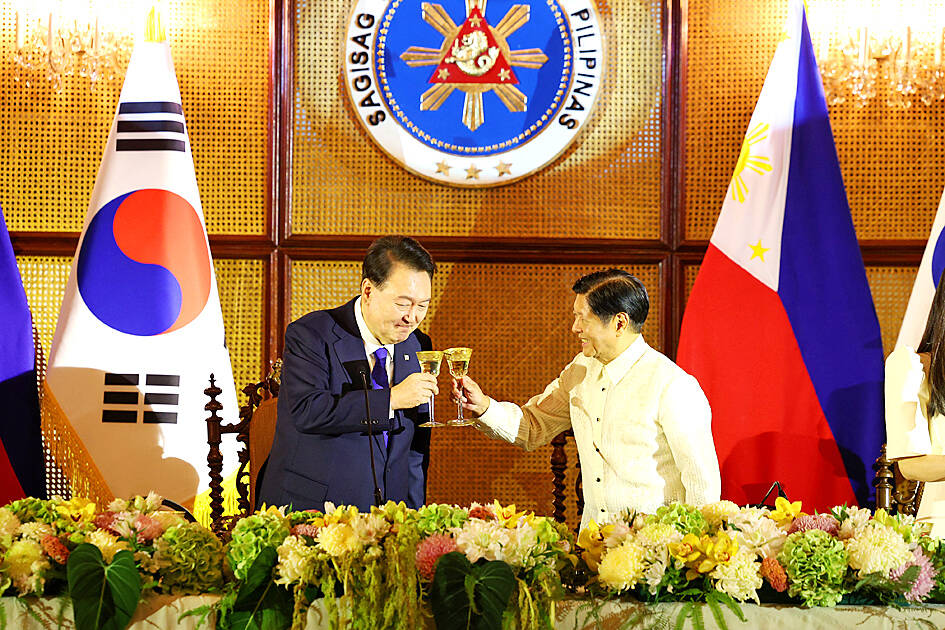South Korean President Yoon Suk-yeol and Philippine President Ferdinand Marcos Jr yesterday agreed to boost defense cooperation as their nations elevated ties to a strategic partnership amid growing security challenges in the region.
The two leaders discussed a range of issues including tensions in the South China Sea and on the Korean Peninsula during talks at the Philippine presidential palace where they also signed agreements on coast guard cooperation and nuclear energy.
“President Marcos and I opened a new chapter of our partnership by elevating our relationship to a strategic partnership,” said Yoon, who was on a state visit to Manila, the first by a South Korean leader in more than a decade.

Photo: EPA-EFE
Yoon said his nation would take part in the latest phase of the Philippines multibillion-dollar effort to modernize its military security at a time of rising tensions with China in the South China Sea.
South Korea has been trying to ramp up global defense exports, as Russia’s invasion of Ukraine opened the door to sign contracts from Europe, the Middle East and Asia.
The nation, which has sold FA-50 jets, corvettes and frigates to the Philippines, aims to become the world’s fourth-largest arms exporter by 2027.
In the third phase of its modernization plan, the Philippine military is looking to buy advanced assets such as fighter jets, submarines and missile systems, to beef up territorial defense and maritime security.
The two leaders agreed to uphold an international rules-based order, including on safety of navigation in the South China Sea, Yoon said, adding that they agreed the international community would never condone North Korea’s nuclear program or what he called “reckless provocations.”
Yoon, who was elected in 2022 on a pledge to boost South Korea’s nuclear power industry by targeting the export of 10 more nuclear power plants by 2030, announced the signing of a memorandum of agreement for a feasibility study on the long-dormant Philippine Bataan Nuclear Power Plant.
The plant has not produced any electricity since it was finished in 1984, despite its US$2.3 billion price tag and its promise of energy security during the 1970s oil crisis.

FIREPOWER: On top of the torpedoes, the military would procure Kestrel II anti-tank weapons systems to replace aging license-produced M72 LAW launchers Taiwan is to receive US-made Mark 48 torpedoes and training simulators over the next three years, following delays that hampered the navy’s operational readiness, the Ministry of National Defense’s latest budget proposal showed. The navy next year would acquire four training simulator systems for the torpedoes and take receipt of 14 torpedoes in 2027 and 10 torpedoes in 2028, the ministry said in its budget for the next fiscal year. The torpedoes would almost certainly be utilized in the navy’s two upgraded Chien Lung-class submarines and the indigenously developed Hai Kun, should the attack sub successfully reach operational status. US President Donald Trump

TPP RALLY: The clashes occurred near the Chiang Kai-shek Memorial Hall on Saturday at a rally to mark the anniversary of a raid on former TPP chairman Ko Wen-je People who clashed with police at a Taiwan People’s Party (TPP) rally in Taipei on Saturday would be referred to prosecutors for investigation, said the Ministry of the Interior, which oversees the National Police Agency. Taipei police had collected evidence of obstruction of public officials and coercion by “disorderly” demonstrators, as well as contraventions of the Assembly and Parade Act (集會遊行法), the ministry said in a statement on Sunday. It added that amid the “severe pushing and jostling” by some demonstrators, eight police officers were injured, including one who was sent to hospital after losing consciousness, allegedly due to heat stroke. The Taipei

NO LIVERPOOL TRIP: Taiwan’s Lin Yu-ting, who won a gold medal in the boxing at the Paris Olympics, was embroiled in controversy about her gender at that event Taiwanese boxer Lin Yu-ting (林郁婷) will not attend this year’s World Boxing Championships in Liverpool, England, due to a lack of response regarding her sex tests from the organizer, World Boxing. The national boxing association on Monday said that it had submitted all required tests to World Boxing, but had not received a response as of Monday, the departure day for the championships. It said the decision for Lin to skip the championships was made to protect its athletes, ensuring they would not travel to the UK without a guarantee of participation. Lin, who won a gold medal in the women’s 57kg boxing

The US has revoked Taiwan Semiconductor Manufacturing Co’s (TSMC, 台積電) authorization to freely ship essential gear to its main Chinese chipmaking base, potentially curtailing its production capabilities at that older-generation facility. American officials recently informed TSMC of their decision to end the Taiwanese chipmaker’s so-called validated end user (VEU) status for its Nanjing site. The action mirrors steps the US took to revoke VEU designations for China facilities owned by Samsung Electronics Co and SK Hynix Inc. The waivers are set to expire in about four months. “TSMC has received notification from the US Government that our VEU authorization for TSMC Nanjing